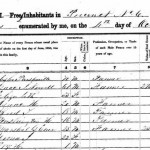Though her likeness has never graced a coin, a Quaker woman who made significant advances for women’s rights spent much of her adult life in Indiana. An Orthodox Quaker belonging to Richmond, Indiana’s upper crust, Rhoda Coffin devoted herself to the improvement of less fortunate women’s lives. Born in Ohio in 1826, Rhoda came to Indiana at age 18 to attend the Whitewater Monthly Meeting School in Richmond, at that time the center of Quaker activity in the Midwest.
In time, Rhoda married Charles Coffin, of the prominent Wayne County family, and assumed her position as a bank president’s wife and, eventually, the mother of six. Although a certain level of benevolent service was expected of ladies of her echelon, Rhoda Coffin surpassed societal expectations along with Quaker strictures regarding gender roles to initiate reforms for women and children.
Not as radical as the more visible suffragists and temperance crusaders of her era, Coffin’s faith in the power of women’s moral influence guided her engagement with society. With her husband, Coffin opened the Marion Street Sabbath School in Richmond’s working-class south side in 1864. Straining against the patriarchal restrictions of the church organization, Coffin went on to found the Home Mission Association, a Quaker women’s group that worked to establish the Home for Friendless Women in 1868. In time, Rhoda Coffin’s scope broadened.
Her efforts to create a separate state penitentiary for women and to emphasize the rehabilitation of the incarcerated would place her at the forefront of the national prison reform movement. The Indiana Reformatory Institute for Women and Girls that opened in 1873 in Indianapolis was the first prison run exclusively by women. A subsequent effort was personally transformative for Coffin; having successfully lobbied for a female physician at the Indiana Hospital for the Insane, she recalled “I came out of that contest a full-fledged woman suffragist. If a vote was necessary before I could succeed in getting a woman physician to care for the helpless of my sex, I decided that I must have a vote.”
In later years, Rhoda’s husband Charles was accused of fraud and embezzlement after his Richmond bank went into receivership, and the Coffins moved to Chicago. Rhoda continued her work on behalf of prison reform, women’s rights and children’s defense until her death in 1909.






















